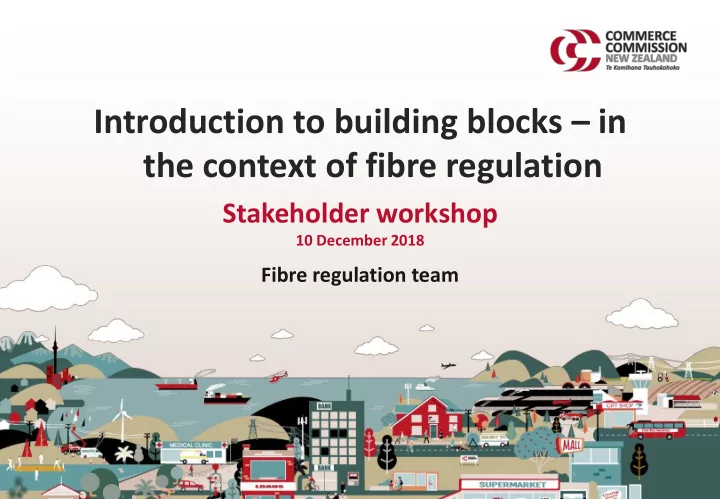

Introduction to building blocks – in the context of fibre regulation Stakeholder workshop 10 December 2018 Fibre regulation team
Overview We propose to apply the Building Blocks Model (BBM) to the fibre regime What do we mean by Building Blocks Model (BBM)? How will BBM apply to the regime for fibre? What we have said in our proposed approach paper on BBM An explanation of the key components of BBM 2
Part 6 of the Telecommunications (New Regulatory Framework) Amendment Act 2018 3
What do we mean by Building Blocks Model (BBM)? Working definition for today Method for calculating the revenues or profitability for a regulated firm from the sum of their their actual and forecast costs for a period Things to note for todays session Assumes an allowance for Based on conventional the firm to have the Includes a ‘rolled forward regulatory accounting opportunity to earn a regulated asset base’ normal return • Utility style regulation • In line with the purpose • Capital expenditure statement of Part 6 of the recovered over time, and • Applied in our regulation of Telco Act carried between regulatory Energy Networks and periods Airports under Part 4 of the • In line with the economic Commerce Act 1986 principles outlined in our • Operational costs allowed proposed approach paper for in the short term 4
Overview – BBM Return on Capital costs capital (Recovered by firm in Return of long term) capital (depreciation) Operating Revenues expenditure Operational costs (OPEX) (Recovered by firm in Tax short term) allowance Pass through Revaluations Other costs / wash up 5
How will BBM be applied? Headline: In order to set the required regulations (and upfront rules that underpin them) we need a Two forms of regulation method for the Commission to determine the appropriate costs of the firms. Will include a maximum revenue Price-quality allowance (path) regulations based on costs Upfront rules (input methodologies ) Will include information requirements on Information costs for disclosure assessments of requirements profitability 6
Price-quality regulation – Example from Electricity Transmission Revenues 7
Information disclosure requirements – Example from Electricity Distribution Profitability 8
What we said in our paper – Building Blocks Model We note that the use of the buildings blocks model ( BBM ) is not explicitly prescribed by the Telecommunications Act 2001 ( Act ). Although it has been included in MBIE consultation documents. Our decisions, including methods for implementing regulation (PQ + ID) must be chosen to best give effect to the purpose statement in the Act. Our preliminary view is that the BBM approach with a ‘rolled -over Regulatory Asset Base’ would likely give best effect to the objectives of Part 6 of the Act. 9
Building Blocks – as set out in our paper 10
Overview – BBM Return on Capital costs capital (Recovered by firm in Return of long term) capital (depreciation) Operating Revenues expenditure Operational costs (OPEX) (Recovered by firm in Tax short term) allowance Pass through Revaluations Other costs / wash up 11
Capital costs – what are they? Both of these cost components are based on the value invested in assets. In order to calculate them, we need to use the value of the Regulated Asset Base (RAB) as an input. Regulatory asset The return on capital is the base ( RAB ) amount needed to cover the Return on ongoing costs of investment in the capital firms assets. Weighted average cost of capital ( WACC ) The return of capital is the diminution Regulatory asset in asset values over time (known as base ( RAB ) Return of depreciation). capital Depreciation rate 12
Regulated Asset Base - RAB Opening RAB (previous year) Value of Rolled- Commissioned Regulatory Assets ( CAPEX ) forward asset base RAB ( RAB ) calculation Revaluations Depreciation 13
Building Blocks Model (BBM) – Price-quality regulation Regulatory asset Return RAB base ( RAB ) on capital Opening RAB (previous year) Weighted average Return of cost of capital capital (deprecia ( WACC ) Value of tion) Commissioned Assets (CAPEX) Revenues Operational Expend (OPEX) Revaluation gains Regulatory asset Tax base ( RAB ) allow Depreciation (from last Pass period) through costs / Depreciation Revals wash up method ‘Roll forward’ RAB process 14
Building Blocks Model (BBM) – Information disclosure – profitability assessments Actual Actual return Solve for ? profitability on capital Return of Compare capital (deprecia to tion) Revenues Operational Expend Expected (OPEX) Estimated profitability WACC Tax allow Pass through costs / wash Revals up
Building blocks model - how it links to input methodologies The legislation requires the Commission to develop upfront rules called input methodologies – how do these relate to BBM? Input methodologies we will Relevant building blocks (indicative) determine Cost of capital Weighted average cost of capital ( WACC ) Asset valuation Regulatory asset base ( RAB ) Depreciation method Revaluations Allocation of common costs Regulatory asset base ( RAB ) Operational Expend ( OPEX ) Taxation Tax allowance Quality dimensions Additional adjustments – incentives? Rules and processes All – Cross-cutting Capital Expenditure Regulatory asset base ( RAB ) 16
What we have covered today We propose to apply the Building Blocks Model (BBM) to the fibre regime What do we mean by Building Blocks Model (BBM)? How will BBM apply to the regime for fibre? What we have said in our proposed approach paper on BBM An explanation of the key components of BBM 17
Appendix: Weighted average cost of capital (WACC) In our proposed approach paper, we are proposing to use the Part 4 cost of capital input methodologies as our starting point Key components of Part 4 cost of capital input methodologies 18
Recommend
More recommend